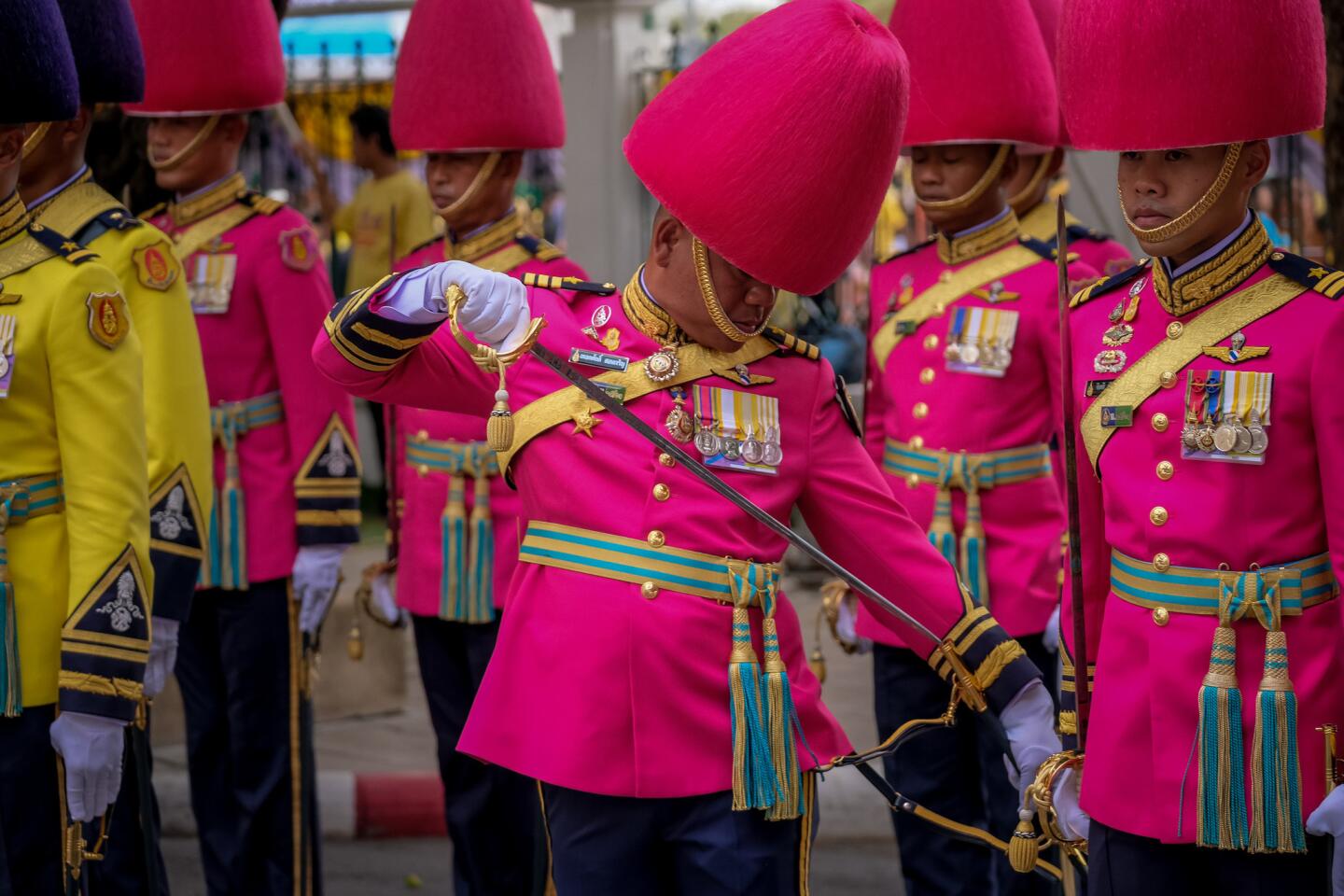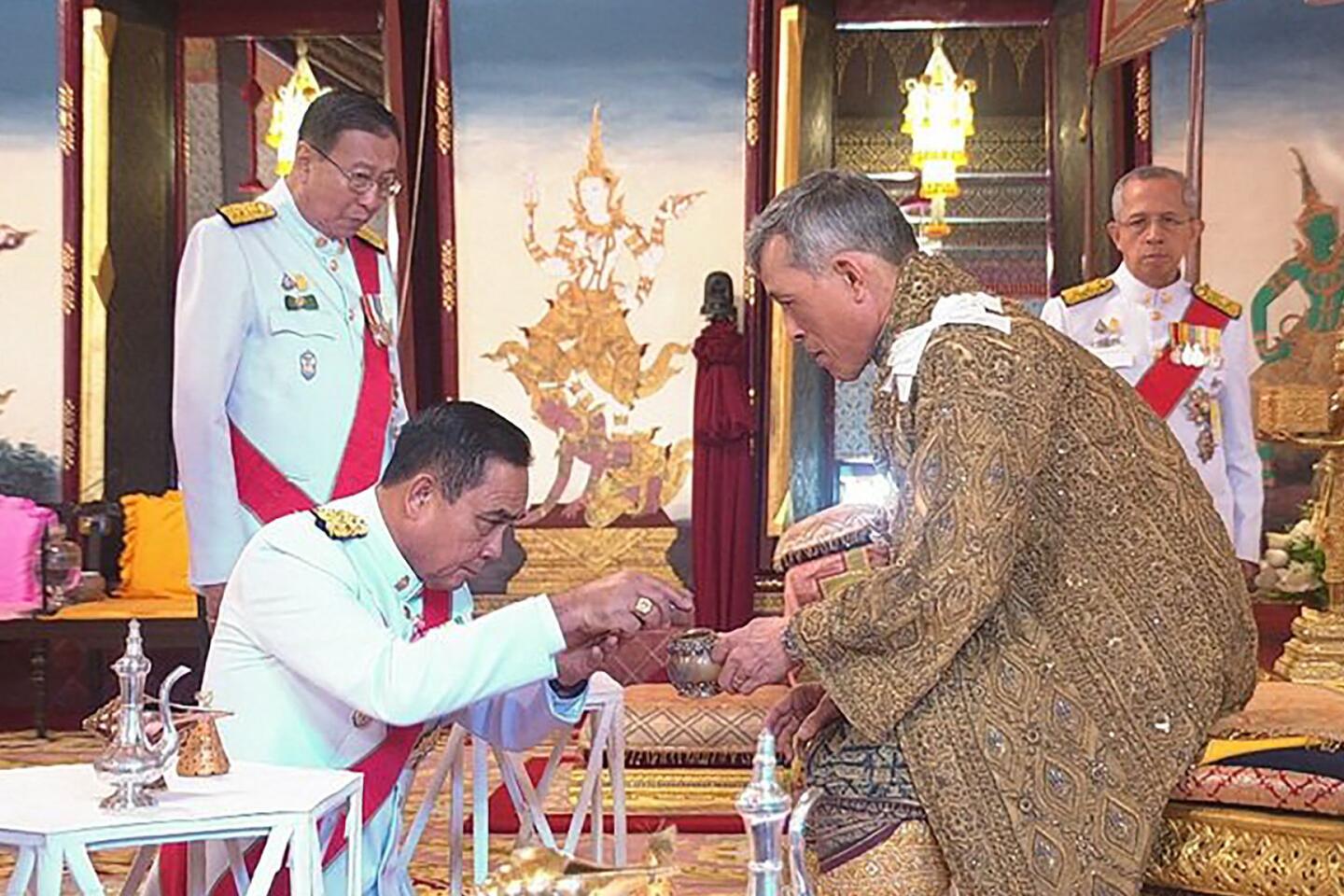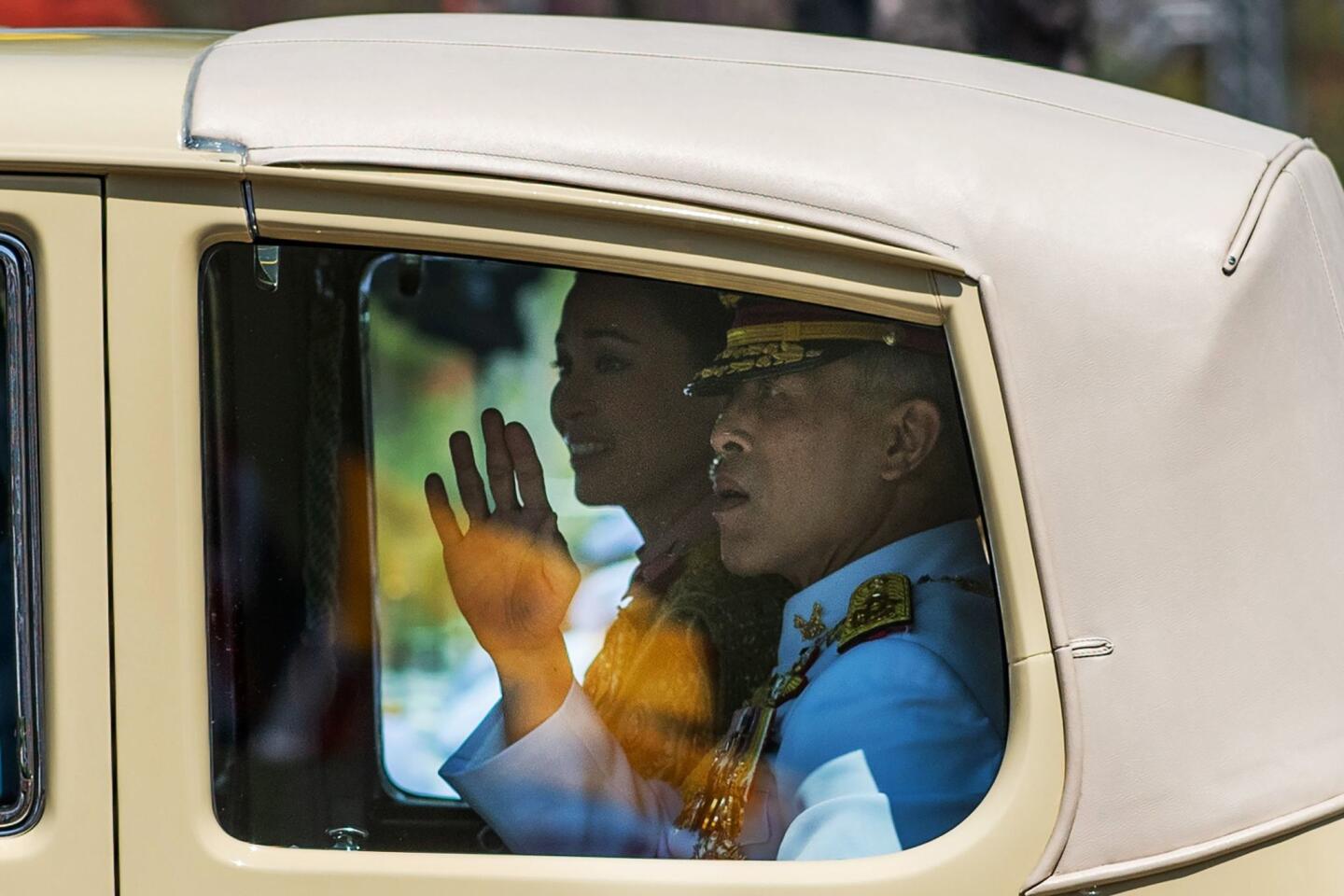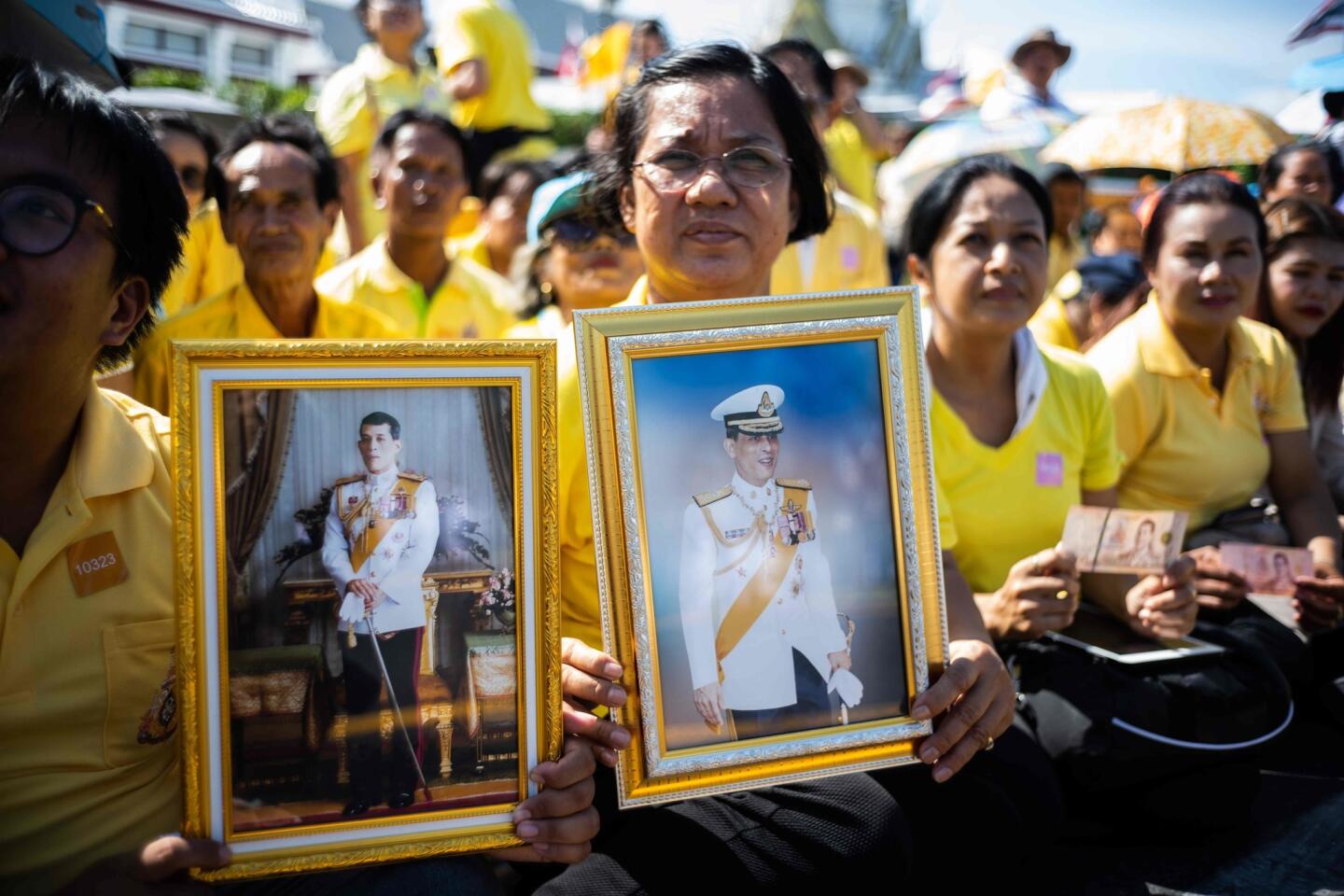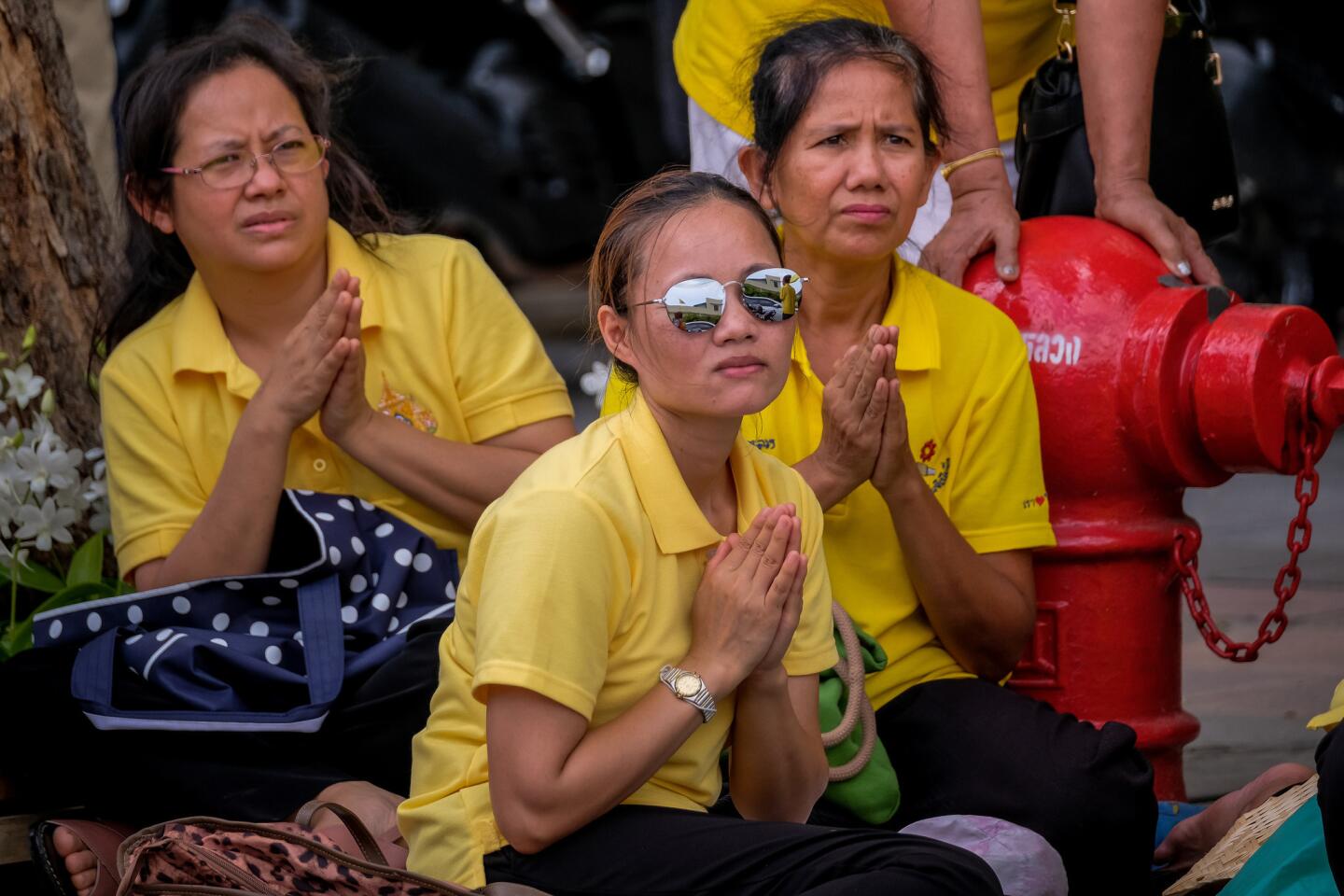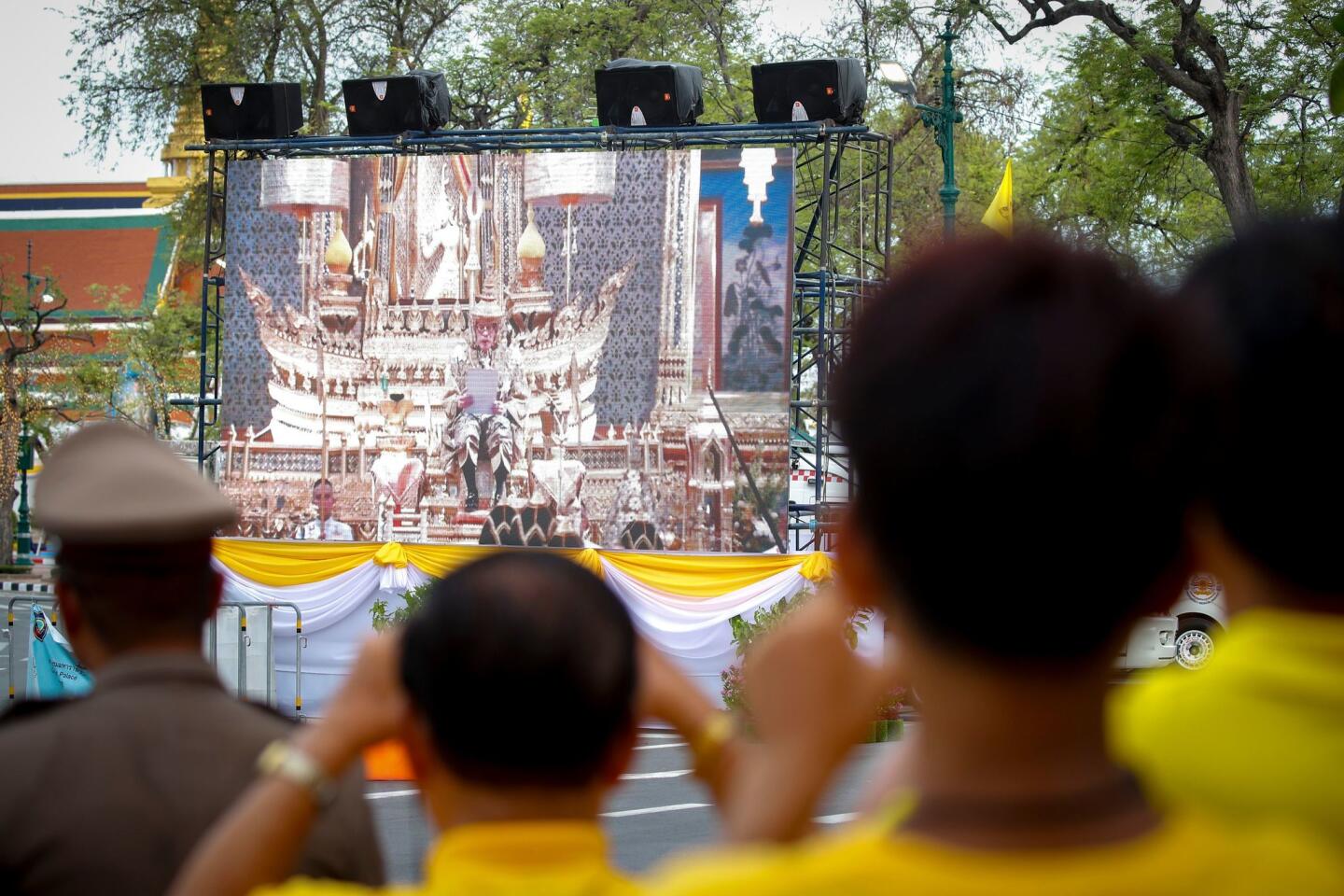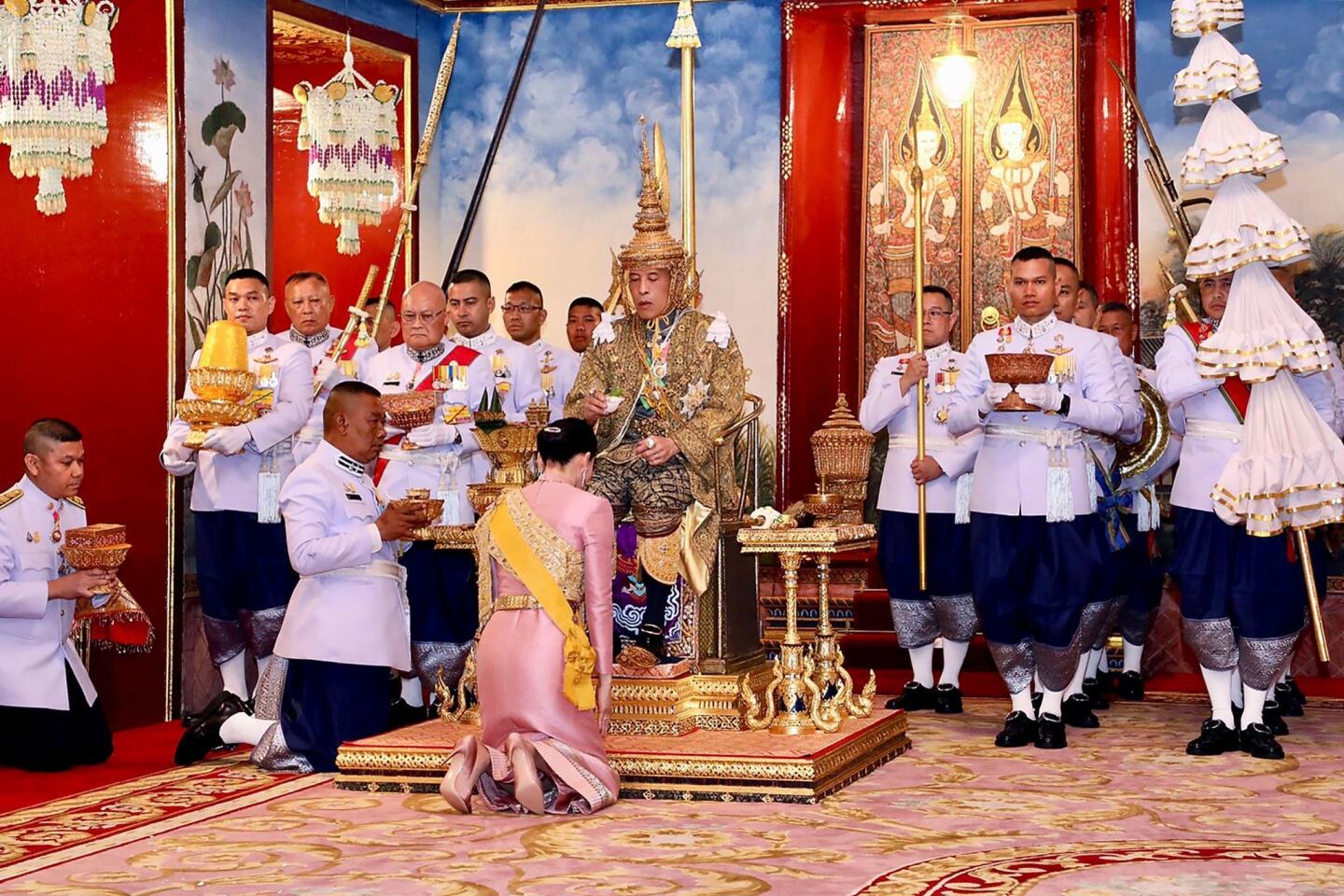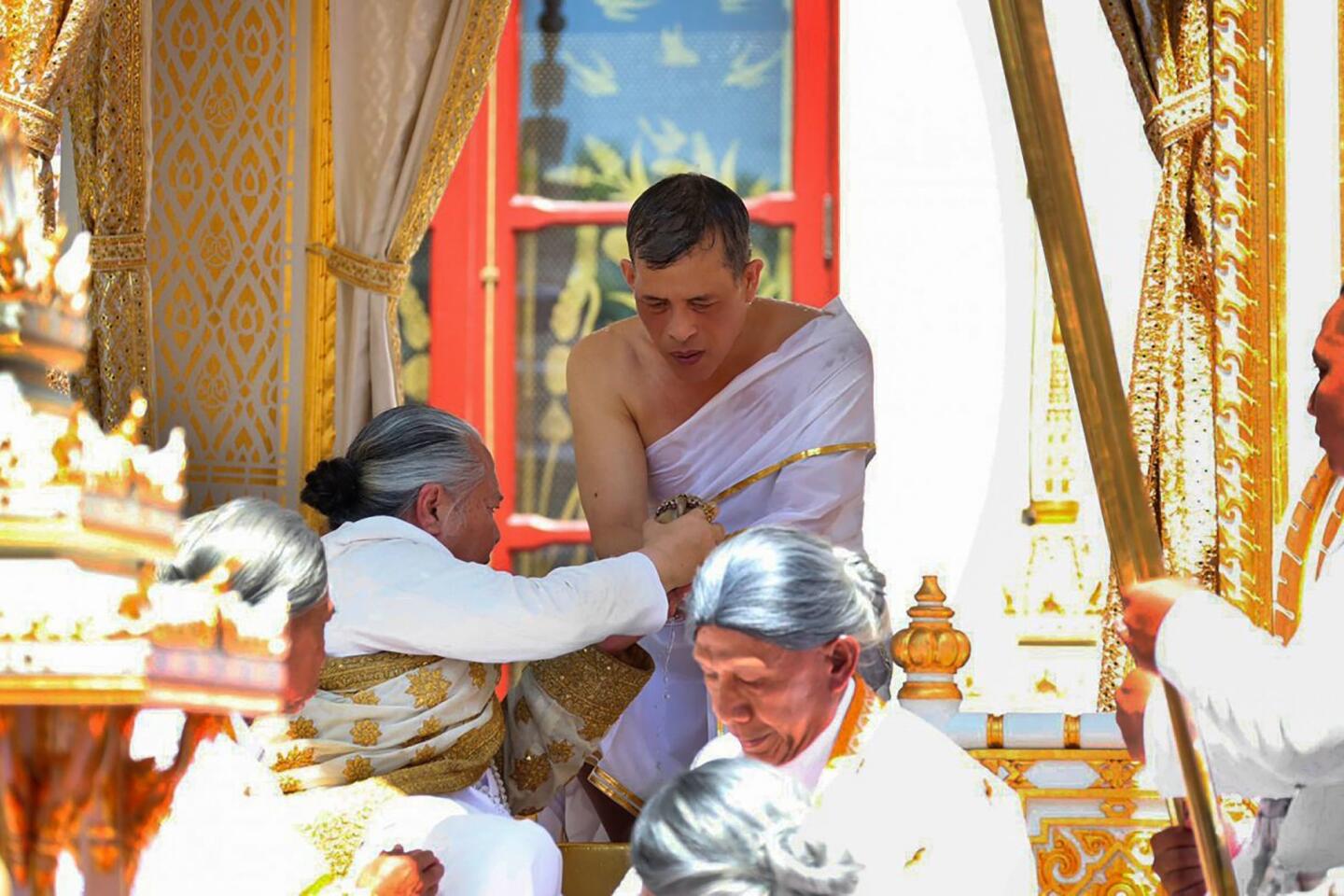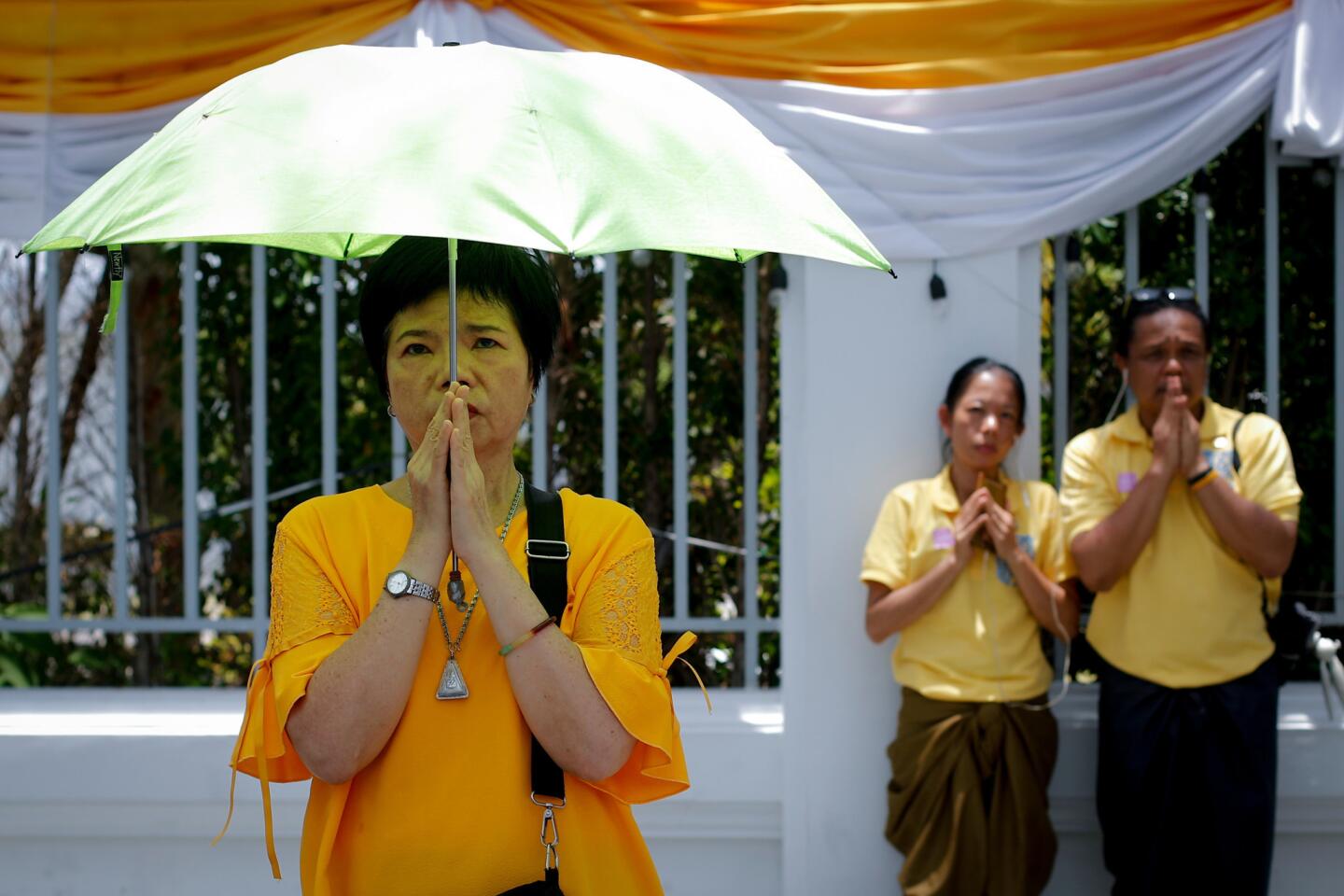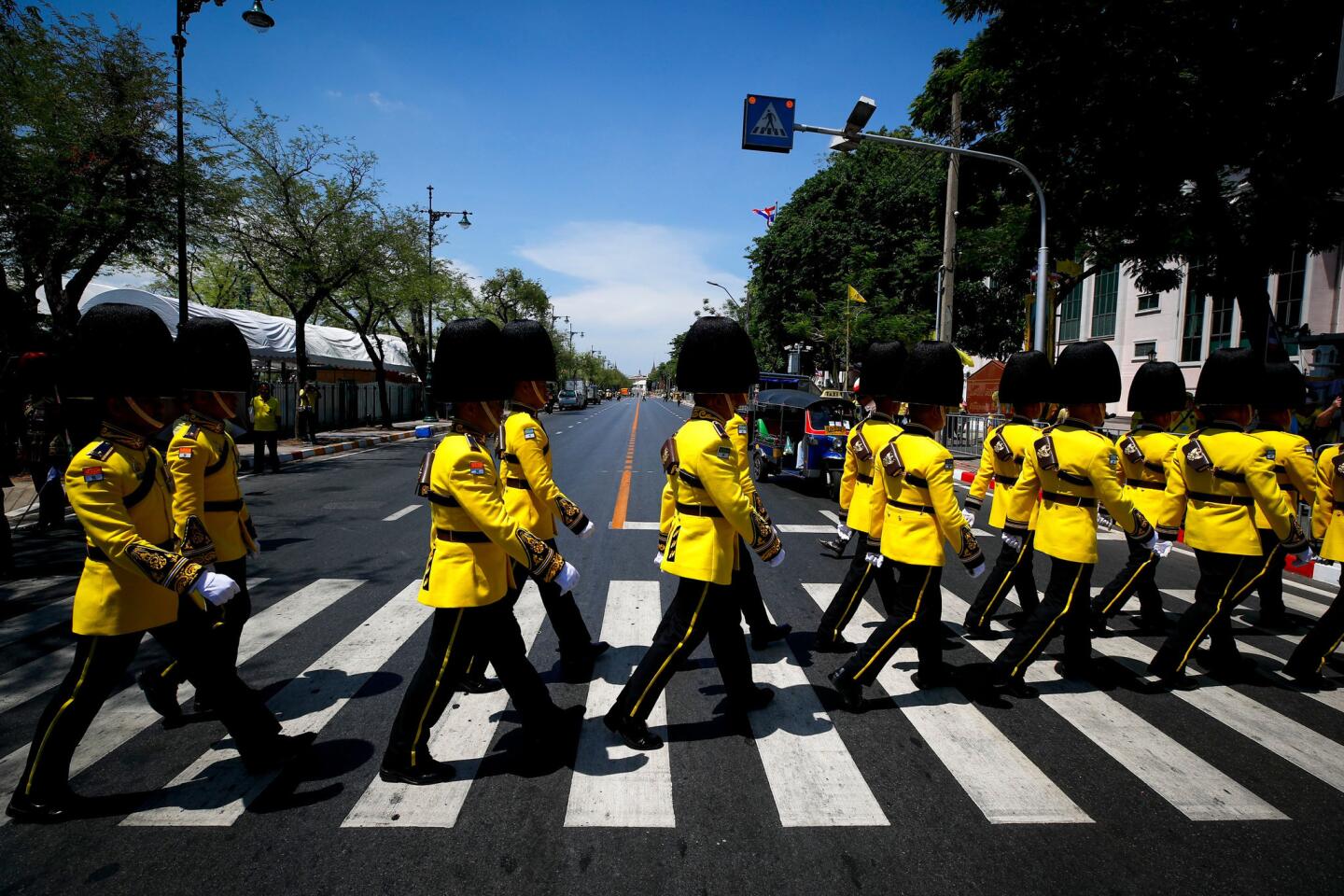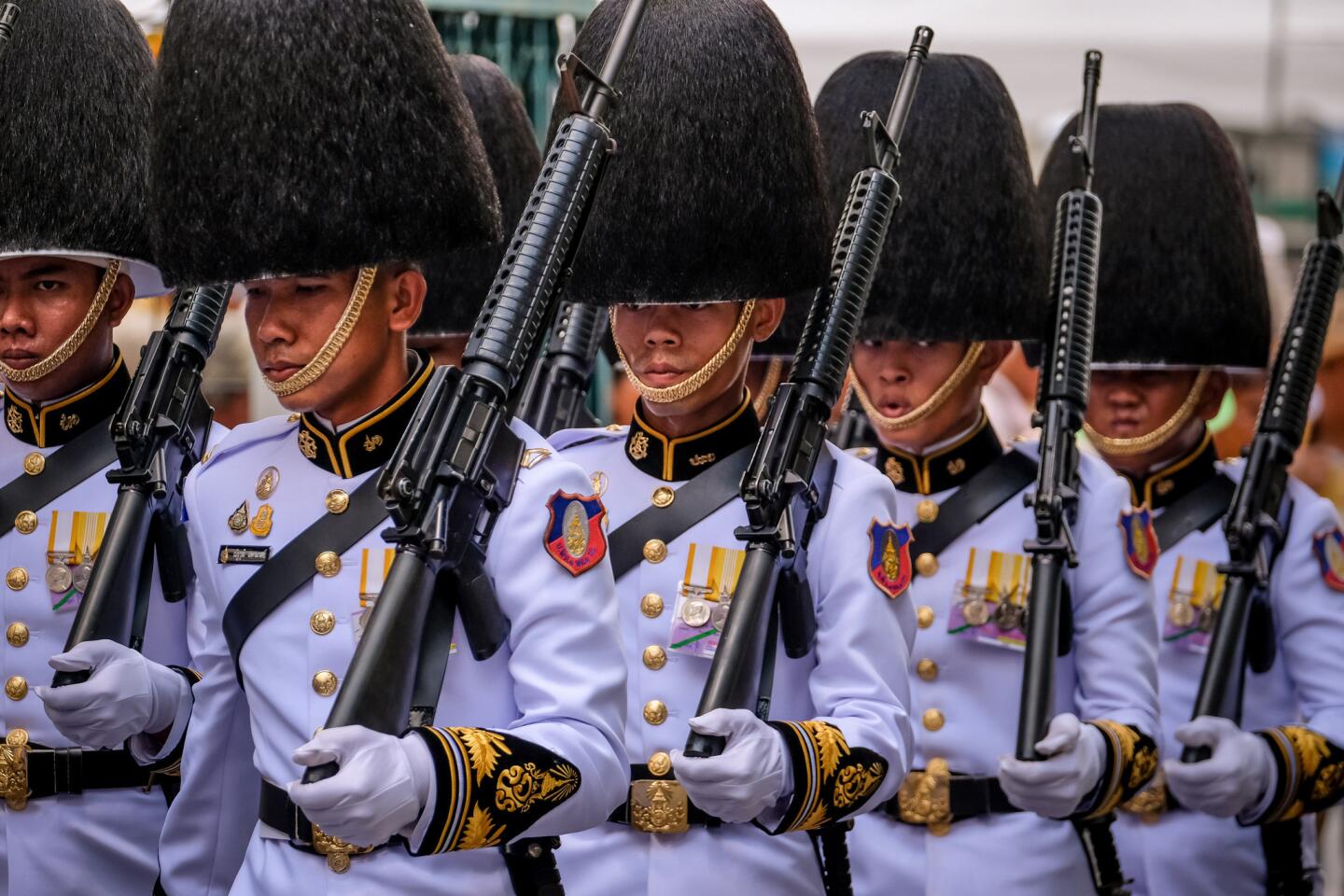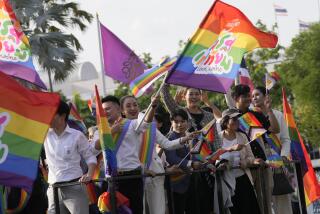Thailand crowns its king in a gilded spectacle rarely seen in the modern era
Reporting from Bangkok — Installed on a golden throne under a nine-tiered, white-and-gold umbrella resembling a wedding cake, Thailand’s King Maha Vajiralongkorn was crowned Saturday as ruler of one of the world’s most enduring monarchies in solemn, elaborate ceremonies that sought to unite a fractured nation under gilded pageantry and centuries-old ritual.
The long awaited coronation — the first in Thailand in nearly seven decades — melded ancient spirituality with imperial traditions as the 66-year-old king was anointed with water consecrated by Hindu Brahmin priests and blessed by the incantations of saffron-clad Buddhist monks.
Then, inside a long hall lined with murals at Bangkok’s Grand Palace, Vajiralongkorn was handed a collection of royal regalia: a scepter, gold-embroidered slippers, a sword that belonged to his 18th century ancestors and a 16-pound pointed crown encrusted with diamonds that he fastened at his chin like a bike helmet.
The daylong spectacle — the start of three days of ceremonies — was aimed at reasserting the monarchy as the guiding force of Thai public life.
Far from a figurehead, the Thai king has veto power over key government decisions, such as executive appointments and constitutional changes, and is legally protected from criticism. Since taking over for his late father 2½ years ago, Vajiralongkorn has sought to exert greater royal authority during a period of deep political and social divisions.
Five days from now, Thailand is scheduled to release the official results of the March 24 elections, the first since a 2014 military coup. An army-backed party and opposition groups are each claiming the right to form the next government, threatening to unleash another period of the gridlock and street protests that have gripped Thailand for more than a decade.
The monarchy and the military have traditionally protected each other in Thailand, the army regularly intervening to depose elected governments it views as hostile to the royal establishment. On the eve of the election, Vajiralongkorn issued a statement calling on Thais to vote for “good people” — which was interpreted to mean “fervent nationalist, royalist Buddhists [who] revere the king,” according to Eugénie Mérieau, a Thailand expert at the University of Gottingen in Germany.
Weeks earlier, the king had forbidden his elder sister, Ubolratana Mahidol, from running for prime minister for a party aligned with Thailand’s most powerful opposition figure. While the king said that it would be “extremely inappropriate” for a member of the royal family to enter politics, his statements signaled his plans to be “a very interventionist king,” Mérieau said.
On Saturday, for a few hours, both sides of the political divide sat together under the same red-painted ceiling at the palace.
Prime Minister Prayuth Chan-ocha, the leader of the ruling junta who is bidding to keep power, was one of eight male dignitaries, including palace religious scholars and senior members of the royal family, who poured sacred water on the king’s hands in a ritual meant to show that the monarch had the support of all corners of the country.
Ubolratana, meanwhile, posted an Instagram selfie from the ceremony with another royal sibling, Princess Maha Chakri Sirindhorn.
“These ceremonies confer sacredness to the king,” Mérieau said. “Royal ceremonies provide a sense of continuity beyond questions of tradition and modernity — it embodies the principle of the Thai monarchy being the core of the Thai nation.”
The death of Vajiralongkorn’s father, the late King Bhumibol Adulyadej, who ruled for seven decades, drew masses of tearful Thais into the streets of Bangkok and prompted weeks of official mourning. Vajiralongkorn, who lives much of the year in Germany, is a much more private and mysterious figure and far less well known to Thais despite efforts by the palace to portray him as a benevolent, youthful ruler keen on education and bicycling.
Crowds were sparse in the streets surrounding the palace, with few Thais braving security checkpoints to show their support for the new monarch. Police sources said only a few thousand people had come out, though they declined to be named lest they be seen as criticizing the king, a criminal offense.
Kittipawan Noenyai, 54, waited four hours to catch a glimpse of the king’s vehicle arriving at the Grand Palace, carrying a portrait of him in military uniform as she stood along the route his car would take.
Finally, the car appeared shortly before 10 a.m., a pale yellow vintage limousine bearing the license plate number 1. As Vajiralongkorn rode past, Kittipawan saw him waving from the back seat.
“I started weeping and then I raised his portrait and shouted, ‘Long live the king,’ hoping he would hear me,” she said.
“I can’t believe I saw him with my own eyes.”
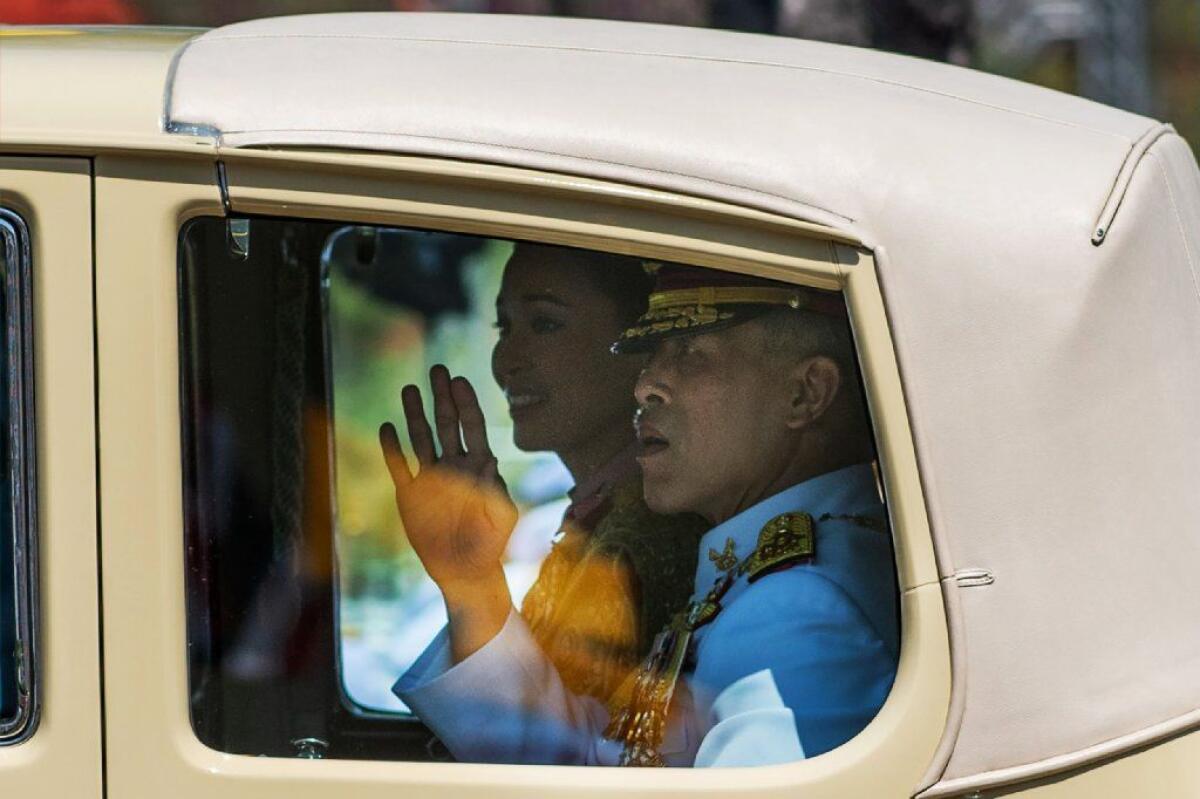
Arriving at the cream-colored palace topped by golden spires, the king stepped out of the car wearing a white military-style jacket and gold sash. Uniformed men knelt as he strode past along a red carpet, his new wife, Queen Suthida, following close behind in a pink silk dress and matching high heels.
Changing into a white toga-style garment with gold trim and plush white slippers, the king walked into a courtyard and sat under a white pavilion, where he was doused with water from a canopied shower head in what was called a “purification bath.”
Collected from across Bangkok’s 76 provinces and consecrated by Brahmin priests, the holy water reflected the Hindu traditions that course through spiritual life in Thailand, where most people identify as Buddhist.
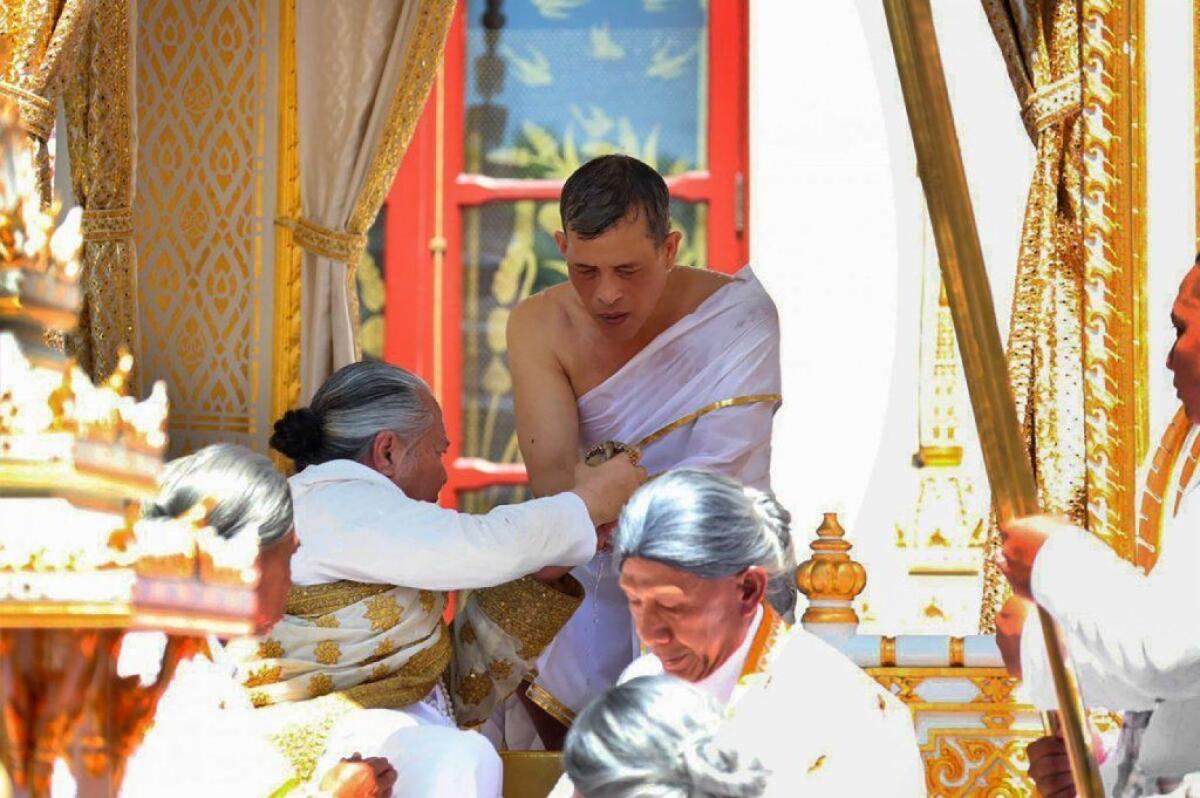
Back inside the palace, the king changed into his royal vestments — an embroidered golden robe, medallions and patterned silk breeches — and sat on an octagonal throne made of fig wood. After receiving the sacred water from eight men including the prime minister, the king was handed the crown, created in the late 18th century at the start of the Chakri dynasty and inspired by European royalty.
Cannons sounded on the palace grounds, and bells clanged at temples.
The king then placed a yellow sash around the queen, who lay on the floor before him — just as she had done during their surprise wedding ceremony days earlier. When it was over he stood up and scattered flower petals on the carpet in front of members of his family who also prostrated and bowed, including his 14-year-old son and presumed heir, Dipangkorn. (The king has been married four times and has seven children.)
As the king walked out of the room, the royal family members got to their knees and picked the bits of flower out of the carpet, an announcer said on Thai television.
In his first royal command, Vajiralongkorn, who will rule as King Rama X, the 10th monarch of the 237-year-old Chakri dynasty, pledged to “forever reign with righteousness, for the benefit and happiness of the people.”
The scale and pageantry reflected not only time-honored rituals but also the growing wealth of the monarchy, which controls tens of billions of dollars in banking and real estate assets that the king brought under his personal control after his father died. The government said the coronation would cost about $30 million.
“The lavishness of the coronation indicates the association of the monarchy with material wealth that has become so pronounced during the past 30 or 40 years,” said Michael Montesano, coordinator of the Thailand Studies Program at Singapore’s ISEAS-Yusof Ishak Institute.
“Modern Thailand is a wealthy country, and in that sense there is little contradiction between Thai visions of modernity and the extremely lavish re-creation of putatively ancient rites.”
Much of Bangkok, however, ignored the proceedings. A 28-year-old sales representative, who gave his name only as Bon, said he didn’t watch the ceremony because he had to work.
“I have no time to sit in front of TV. I think it’s boring and it’s complicated to understand,” he said.
On Sunday, in temperatures forecast to approach 100 degrees, soldiers were to carry the king in a palanquin along a nearly four-mile route to a series of Buddhist temples. The king was also expected to confer titles on members of the royal families and other aides.
The coronation promotes “the illusion of a united nation,” Mérieau said, “but Thailand is as divided now as it was when the military seized power five years ago.”
Special correspondent Wilawan Watcharasakwet contributed to this report.
More to Read
Sign up for Essential California
The most important California stories and recommendations in your inbox every morning.
You may occasionally receive promotional content from the Los Angeles Times.
